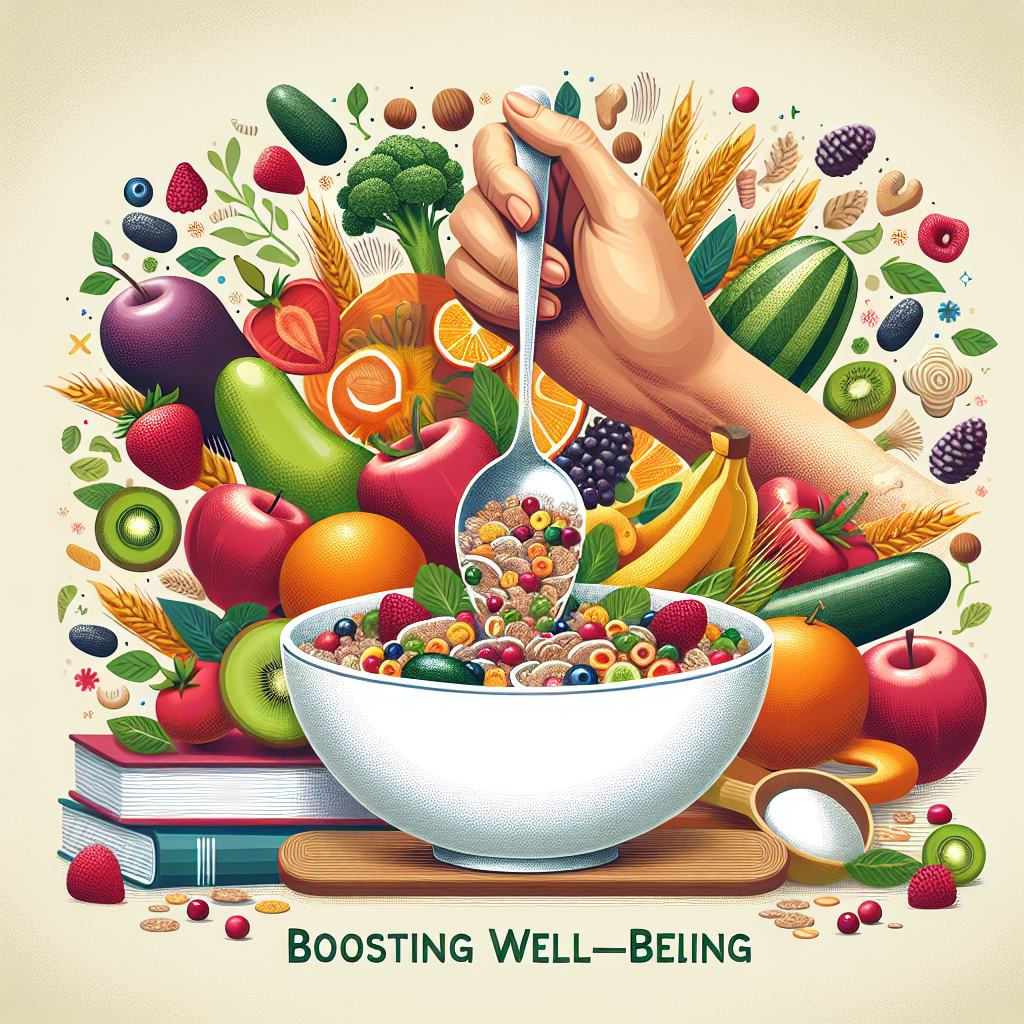Boost Your Well-Being: Simple Ways to Integrate Nutritious Foods into Your Diet
Introduction
In today’s fast-paced world, it’s easy to prioritize convenience over health when it comes to our diets. But making sure we are nourishing our bodies with the right nutrients is crucial for our overall well-being. In this article, we will explore simple ways to integrate nutritious foods into your diet to boost your well-being.
Why a Nutritious Diet is Important
A nutritious diet plays a vital role in maintaining good health and preventing chronic diseases. Consuming a variety of nutrient-dense foods provides the essential vitamins, minerals, and antioxidants that our bodies need to function properly. In addition, a balanced diet can help manage weight, increase energy levels, improve digestion, and enhance mood.
On the other hand, a diet high in processed foods, saturated fats, sugars, and additives can lead to a host of health problems, such as obesity, heart disease, diabetes, and cancer. By choosing whole, real foods that are rich in nutrients and low in unhealthy fats and sugars, you can significantly reduce your risk of developing these conditions.
Simple Ways to Integrate Nutritious Foods into Your Diet
1. Start with a Healthy Breakfast
Breakfast is often referred to as the most important meal of the day because it kickstarts our metabolism and provides us with the energy we need to start our day. However, many people either skip breakfast altogether or opt for sugary, processed options that do not provide lasting energy.
To ensure you are starting your day right, aim to include a balance of protein, healthy fats, and carbohydrates in your breakfast. Some nutritious options include:
– Greek yogurt with fresh fruit and nuts
– Oatmeal topped with berries and a spoonful of almond butter
– Scrambled eggs with spinach and whole-grain toast
– Smoothie made with spinach, banana, almond milk, and protein powder
By fueling your body with a nutritious breakfast, you will feel more energized, focused, and satisfied throughout the day.
2. Pack Nutrient-Dense Snacks
Snacking can be a significant source of empty calories if you are not careful. Instead of reaching for processed chips, cookies, or candy, keep nutrient-dense snacks on hand to satisfy your cravings and provide your body with essential nutrients.
Some healthy snack options include:
– Raw vegetables with hummus
– Fresh fruit with a handful of nuts
– Greek yogurt with granola
– Rice cakes with avocado and tomato
– Trail mix with dried fruit and seeds
By choosing whole foods that are rich in vitamins, minerals, fiber, and protein, you can support your overall health and well-being while keeping hunger pangs at bay.
3. Plan Balanced Meals
Planning balanced meals ahead of time can help you make healthier choices and avoid the temptation of ordering takeout or grabbing fast food when you are short on time. When planning your meals, aim to include a variety of protein sources, complex carbohydrates, healthy fats, and plenty of fruits and vegetables.
To make meal planning easier, consider batch cooking and preparing meals in advance that you can simply reheat throughout the week. This will save you time and ensure you always have healthy options on hand.
4. Choose Whole Foods
When grocery shopping, focus on selecting whole, unprocessed foods that are as close to their natural state as possible. This includes fruits, vegetables, whole grains, lean protein sources, nuts, seeds, and legumes. By incorporating these foods into your diet, you can increase your intake of essential nutrients and reduce your consumption of added sugars, unhealthy fats, and chemicals.
5. Stay Hydrated
Proper hydration is essential for our overall health and well-being. Drinking an adequate amount of water each day helps regulate body temperature, aids in digestion, flushes out toxins, and supports proper kidney function. In addition to water, you can also hydrate with herbal teas, coconut water, and fresh fruit juices.
To ensure you are staying hydrated, carry a reusable water bottle with you throughout the day and sip on water regularly. If you struggle to drink enough water, try infusing it with fresh fruits, herbs, or cucumbers to add flavor.
6. Add Superfoods to Your Diet
Superfoods are nutrient-rich foods that are particularly beneficial for our health due to their high levels of vitamins, minerals, antioxidants, and phytonutrients. Some popular superfoods include:
– Berries: Blueberries, strawberries, and raspberries are rich in antioxidants that help fight inflammation and protect against chronic diseases.
– Leafy greens: Spinach, kale, and Swiss chard are packed with vitamins, minerals, and fiber that support overall health and digestion.
– Salmon: This fatty fish is an excellent source of omega-3 fatty acids, which are essential for brain health, heart health, and reducing inflammation.
– Quinoa: This gluten-free whole grain is a complete protein that provides all nine essential amino acids, making it an excellent plant-based protein source.
By incorporating superfoods into your diet regularly, you can optimize your nutrient intake and support your well-being.
7. Mindful Eating
Practicing mindful eating can help you develop a healthier relationship with food and make more conscious choices about what you eat. Mindful eating involves paying attention to your hunger cues, slowing down during meals, savoring the flavors and textures of your food, and being present while you eat.
By tuning into your body’s signals and being aware of your eating habits, you can prevent overeating, improve digestion, and enjoy your meals more fully.
8. Choose Healthy Cooking Methods
The way you cook your food can significantly affect its nutritional value. Opt for cooking methods that preserve the nutrients in your food while minimizing the use of unhealthy fats and oils. Some healthy cooking techniques include:
– Steaming: Steaming vegetables preserves their vitamins and minerals while retaining their natural flavors and textures.
– Grilling: Grilling lean proteins like chicken, fish, and vegetables imparts a delicious smoky flavor without the need for added fats.
– Roasting: Roasting vegetables in the oven with a drizzle of olive oil enhances their sweetness and crunch while maintaining their nutrient content.
By choosing cooking methods that enhance the natural flavors of your food and preserve their nutrients, you can enjoy delicious, healthy meals that support your well-being.
9. Practice Mindful Eating
Eating mindfully is an essential component of a healthy diet. When you eat mindfully, you pay attention to your body’s hunger and fullness cues, savor the flavors and textures of your food, and enjoy the experience of eating without distractions. This practice can help you make more conscious food choices, prevent overeating, and improve your digestion.
To practice mindful eating, try the following tips:
– Eat slowly and savor each bite
– Chew your food thoroughly
– Notice the colors, smells, and tastes of your food
– Put down your fork between bites
– Avoid distractions like television, phones, or books while eating
By incorporating mindful eating into your daily routine, you can develop a healthier relationship with food and improve your overall well-being.
10. Treat Yourself in Moderation
While it’s essential to prioritize nutrient-dense foods in your diet, it’s also important to indulge in treats occasionally to satisfy your cravings and prevent feelings of deprivation. Instead of completely eliminating your favorite indulgences, allow yourself to enjoy them in moderation.
When craving something sweet, opt for dark chocolate, fresh fruit, or homemade desserts made with natural sweeteners like honey or maple syrup. When craving something salty, choose air-popped popcorn, roasted nuts, or baked vegetable chips.
By incorporating treats into your diet in moderation, you can satisfy your cravings without derailing your healthy eating habits.
Conclusion
Integrating nutritious foods into your diet is a simple yet powerful way to boost your well-being and support your overall health. By making small changes to your eating habits, such as starting your day with a healthy breakfast, packing nutrient-dense snacks, planning balanced meals, choosing whole foods, staying hydrated, adding superfoods to your diet, practicing mindful eating, choosing healthy cooking methods, and treating yourself in moderation, you can nourish your body with the nutrients it needs to thrive.
Remember that a healthy diet is not about perfection but about making conscious choices that support your well-being. By prioritizing nutrient-dense foods, listening to your body’s hunger cues, and enjoying your meals mindfully, you can develop a positive relationship with food and feel your best both inside and out. So why not start today and boost your well-being with nutritious foods that nourish your body and soul.
References:
– Harvard Health Publishing. (2020). The importance of whole grains. https://www.health.harvard.edu/nutrition/the-importance-of-whole-grains
– Mayo Clinic. (2021). Water: How much should you drink every day? https://www.mayoclinic.org/healthy-lifestyle/nutrition-and-healthy-eating/in-depth/water/art-20044256
– National Institute on Aging. (2022). Making healthier food choices. https://www.nia.nih.gov/health/infographics/making-healthier-food-choices
– World Health Organization. (2022). Healthy diet. https://www.who.int/news-room/fact-sheets/detail/healthy-diet
By incorporating these simple tips into your daily routine, you can nourish your body with the nutrients it needs to thrive, feel more energized and focused, and support your overall health and well-being. So why not start today and make small changes that can have a big impact on your health in the long run. Your body will thank you for it.








Leave a Comment